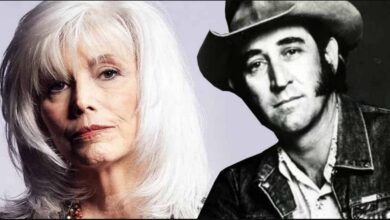Like An Old Lion, His Roar Weakened, But He Stayed A Lion; Johnny Cash Stirred Respect, Love, Sadness, Admiration
Johnny Cash’s final live performance, held on July 5, 2003, at the Carter Family Fold in Hiltons, Virginia, remains a deeply significant and emotional event in the history of country music. This performance, occurring just two months before his death, was marked by Cash’s remarkable resilience and his unwavering connection to his music and his fans. Despite being frail and confined to a wheelchair due to his declining health, Cash delivered a moving 30-minute set that reflected both his enduring spirit and his profound musical legacy.
The setlist for this final performance was a carefully curated selection of some of Cash’s most iconic and beloved songs. Included in the set were classics such as “Folsom Prison Blues,” “I Walk the Line,” “Sunday Mornin’ Comin’ Down,” “Ring of Fire,” “Angel Band,” “Big River,” and “Understand Your Man.” Each song was delivered with the weight of Cash’s extensive career and personal experiences, particularly poignant given the recent passing of his wife, June Carter Cash, in May 2003. This loss was fresh in his mind, and the emotional depth of his performance was palpable.
The performance was imbued with a profound sense of tribute and personal reflection. Notably, Cash dedicated “Ring of Fire” to June Carter Cash, speaking of her enduring presence and the inspiration she provided him despite her absence. This dedication added a deeply personal layer to the performance, underscoring the significant role June had played in his life and career. The emotional resonance of this moment was heightened by Cash’s visibly shaky voice, which, while less robust than in his prime, still carried the characteristic depth and gravitas that had defined his music for decades.
Cash’s musical accompaniment for this final performance was provided by guitarist Jerry Hensley and bassist Bobby Starnes. Their support created a fitting backdrop for Cash’s performance, enhancing the intimate and reflective nature of the concert. The audience, fully aware of the historical significance of the moment, experienced the performance with a heightened sense of reverence and appreciation, further deepening the emotional impact of the evening.
This final concert was more than a mere musical event; it was a powerful testament to Cash’s unwavering passion for music and his deep bond with his audience. Despite his physical limitations, Cash’s dedication to his craft and his ability to convey profound emotions through his music were evident throughout the performance. The event served as a fitting conclusion to a storied career, highlighting both his resilience and his enduring talent.
Johnny Cash, known for his distinctive deep voice, rebellious persona, and hits like “I Walk the Line” and “Folsom Prison Blues,” had a profound influence on the country music genre. His career spanned several decades and included numerous hits that solidified his place as a pioneer in the genre. His music often explored themes of sorrow, redemption, and resilience, reflecting his personal struggles and triumphs.
Born on February 26, 1932, in Kingsland, Arkansas, Cash’s early life was marked by hardship, which influenced his later music. He rose to prominence in the 1950s and 1960s with a string of successful recordings and became known for his distinctive style, which combined elements of country, rock, and folk. His “Man in Black” persona and his deep, resonant voice became his trademarks, earning him a lasting place in the annals of music history.
Throughout his career, Cash was celebrated for his ability to blend various musical styles and his willingness to address difficult and often controversial topics in his lyrics. His influence extended beyond country music, impacting rock, folk, and Americana genres. Cash’s legacy continues to resonate with audiences, and his final performance at the Carter Family Fold remains a poignant reminder of his enduring impact on the world of music.





